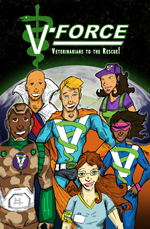 |
| V-FORCE from the AVMA |
I was tickled to discover that the AVMA published a comic book. V-Force! Veterinarians to the Rescue! Did you know that veterinary superheroes have x-ray vision and use it to diagnose leptospirosis? Did you know that some of them (us? can I say some of us?) even have microscopic vision so that they can see microbes and diagnose infection with West Nile Virus? Why didn't I get these super powers when I graduated?
My favorite scene bar none is the one in which the doctor (that is doctor-of-humans not doctor-of-animals) says "I'm just glad the veterinarian was around to help link the cause of the disease." Words spoken by no doctor ever. More fantastical than teleporting veterinarians?
The point of the comic is to leave it lying around in veterinary waiting rooms for small children to pick up, so that they learn a) some of the alternate careers vets can have besides working as small animal clinicians and b) that veterinary medicine isn't just about helping animals, it's about helping people, too. (OneHealth to the rescue! I want a super hero named OneHealth Man!)
I like this effort by the AVMA to communicate some important information about veterinary careers, but I do wonder if a somewhat heavy-handed comic is the best way to do it. You're not going to get a lot of bang for your buck with it (although on the other hand it probably didn't cost all that many bucks to produce, relatively). Hey, AVMA, are you listening to me? (AVMA reps have commented on my blog posts in the past when I've made enough noise, so consider my voice raised now.) I have an idea.
Did you see the recent SyFy show Helix? Which actually starred a veterinary pathologist, and yet didn't do a great job of portraying what veterinary pathology is really like or why it's an exciting career. I think the AVMA, if they are serious about this goal of getting the public to better understand what veterinarians are capable of, should be trying to get more veterinarian characters on TV shows and in movies, and make sure they are well characterized. I suggest one way to do it is to offer a liaison service to Hollywood: the AVMA would provide a veterinarian consultant appropriate for the particular role, and would pay their salary and expenses for the job. The consultant would help the writers make the role realistic.
I'm completely serious about this: I think Hollywood (or part of it) is starting to realize that a realistic depiction of scientists is something its audience is actually interested in, but it's got to be hard to find someone who can speak to the daily life of a veterinary pathologist. Make it easy for them. Because a favorite character on a TV show is something that makes kids, and even adults, consider their future career options in a different light, not a comic book with a clunky story.


No comments:
Post a Comment